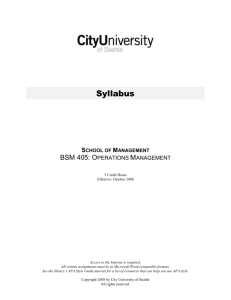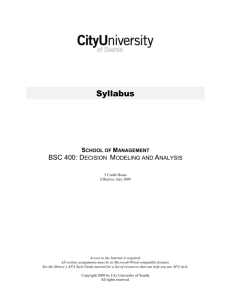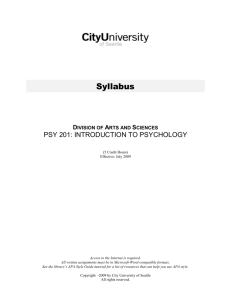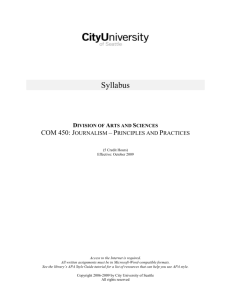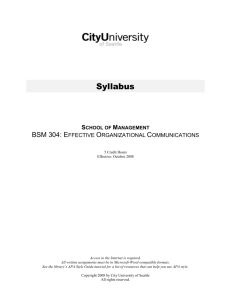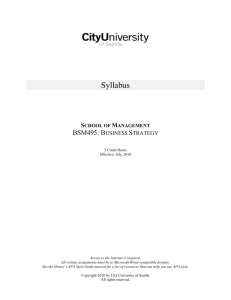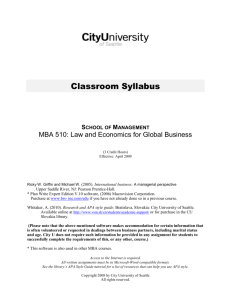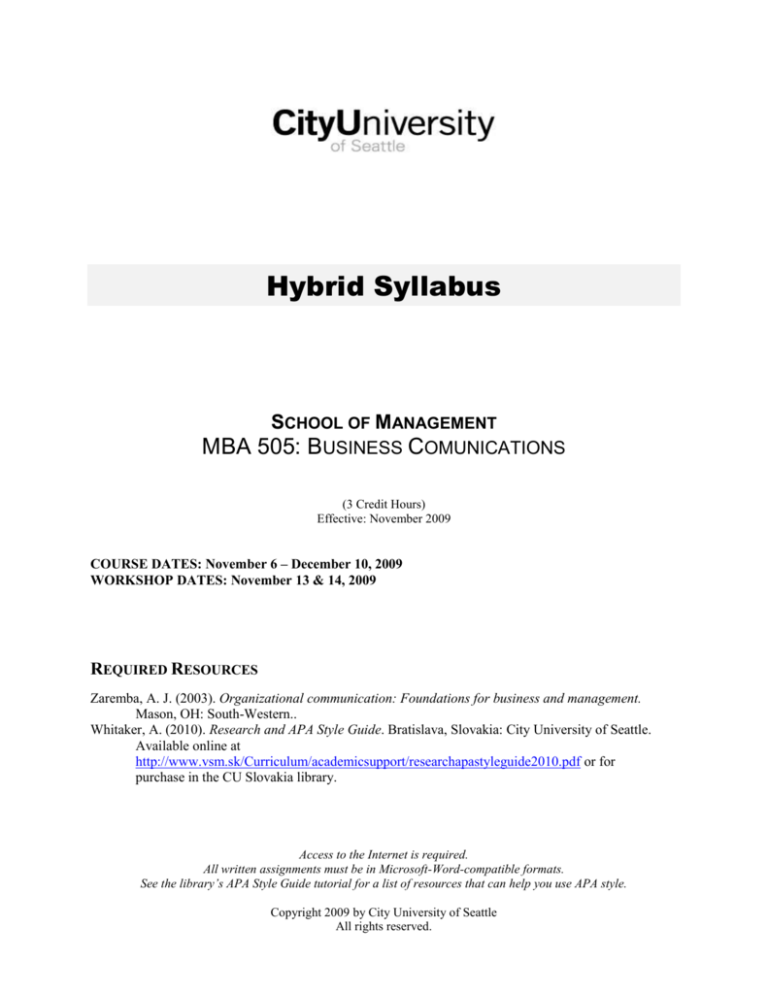
Hybrid Syllabus
SCHOOL OF MANAGEMENT
MBA 505: BUSINESS COMUNICATIONS
(3 Credit Hours)
Effective: November 2009
COURSE DATES: November 6 – December 10, 2009
WORKSHOP DATES: November 13 & 14, 2009
REQUIRED RESOURCES
Zaremba, A. J. (2003). Organizational communication: Foundations for business and management.
Mason, OH: South-Western..
Whitaker, A. (2010). Research and APA Style Guide. Bratislava, Slovakia: City University of Seattle.
Available online at
http://www.vsm.sk/Curriculum/academicsupport/researchapastyleguide2010.pdf or for
purchase in the CU Slovakia library.
Access to the Internet is required.
All written assignments must be in Microsoft-Word-compatible formats.
See the library’s APA Style Guide tutorial for a list of resources that can help you use APA style.
Copyright 2009 by City University of Seattle
All rights reserved.
MBA 505: BUSINESS COMMUNICATIONS
FACULTY
Instructor: David Griffin
Contact Email: dgriffin@cityu.edu
COURSE DESCRIPTION
The knowledge, competence and mastery of human communication are essential for success in every
business setting. This course introduces you to the power of written and oral communication within the
context of a multi-cultural and diverse business environment. You will learn the most effective methods
for communicating information, data, research and ideas to both external and internal stakeholders using
various media.
Prerequisite: Students must have completed MBA 500 or be enrolled concurrently in the course.
COURSE RESOURCES
Required and recommended resources to complete coursework and assignments are listed on the
My.CityU portal at Library>Resources by Course.
CITYU LEARNING GOALS
The content of this course addresses the following CityU Learning Goals:
Professional Competency
Professional Identity
Strong Communication and Interpersonal Skills
Critical Thinking
Commitment to Ethical Practice and Service
Lifelong Learning
PROGRAM CONTEXT
This course helps to meet the following end-of-program outcomes:
Communicate effectively both orally and in writing with internal and external stakeholders;
Lead individuals and organizations to achieve business missions and goals in a global
environment;
Build, lead and participate in productive and diverse teams;
Leverage managerial effectiveness through recognition of individual strengths, values and
business philosophy;
Use people skills to manage diverse work environments and navigate organizational politics;
Recognize when information is needed; find, evaluate and use it to support continuous
professional and organizational development;
Manage projects successfully through effective resource allocation, use of technology and crossfunctional awareness.
MBA 505
Page 2
Eff: 11/09
COURSE OUTCOMES
After completing this course, you will be able to:
Determine the role of communication as a specific competitive advantage in business today;
Compare and contrast different communication styles; identify your own communication style;
Build credibility and professionalism through interpersonal skills, information and data;
Develop and practice a process for team formation, decision making, feedback and conflict
resolution;
Analyze, compare and contrast communication in a diverse and global business environment;
Demonstrate informative and persuasive presentation skills;
Compose various forms of business writing to persuade and inform recipients;
Distinguish and explain communication nuances in organizations (i.e. leadership and power,
networking and politics, negotiation).
CORE CONCEPTS, KNOWLEDGE, AND SKILLS
The course will cover the following concepts and topics:
Myths and facts about communication flow in organizations;
The role of communication in business today;
Types of communication in organizations and how to create conditions for effective
communication;
Forms of power in organizations and the influence of networking vs. politics on the quality of
communication;
Cross-cultural communication;
Impact of globalization and diversity on communication in business;
Communication styles and barriers to communication;
Emotional intelligence;
Giving and receiving effective feedback;
Sources of credibility and practices for building trust;
Importance and practice of listening;
Theory and practice of team formation, team decision making and managing conflict;
Influence of different learning styles and personal values on teamwork;
Relevance of presentation skills in business;
Informative vs. persuasive presentations;
Effective presentations, including visual aids and media;
Layout, structure, guidelines and etiquette for reports, emails, memos, summaries and letters;
Academic and professional integrity: research, information literacy, and documentation skills
(APA) in academics and business;
Coaching skills.
OVERVIEW OF COURSE GRADING
The grade you receive for the course will be derived using City University of Seattle’s decimal grading
system, based on the following:
MBA 505
Page 3
Eff: 11/09
OVERVIEW OF REQUIRED ASSIGNMENTS
% OF FINAL GRADE
Research Paper: Delivering Messages Appropriately
Authoritative Paper
Authoritative Paper Presentation
Active Online Participation
30%
25%
25%
20%
SPECIFICS OF COURSE ASSIGNMENTS
Your instructor will provide grading rubrics that will provide more detail as to how assignments will be
graded.
Research Paper: Delivering Messages Appropriately
A 4-6 page paper which explains rules for communicating in a business culture. Describe a rule or
concept and possible results of not following the rule. In a detailed way, explain the appropriate method
of communication to be used in a particular setting or situation. Explain situations when a rule may be
violated, and practical applications for using and applying the rule in an organizational environment. The
paper must include support from high quality research sources, and use APA citations.
Components
% of Grade
Clear and complete presentation of concepts
Logical organization of ideas and use of research
Integration of course concepts
Grammar spelling punctuation, and format
25%
40%
25%
10%
TOTAL
100%
Authoritative Paper Topics:
TOPIC: Conflicts in Interpersonal Communication
Using knowledge about team building, trust and communication styles, describe types of conflict
situations which occur in organizations and then propose communication solutions. Describe the actions
to be taken to resolve conflicts and handle difficult people. Identify communication alternatives for
interpersonal communication in an organization and for resolving and preventing conflicts.
TOPIC: Crisis Communication
Descibe how a crisis can impact an organization and how communication can be used both incorrectly as
well as effectively during a crisis. Include how to make a crisis communication plan that can be used to
manage communication during a crisis. Evaluate and identify the steps to take, and communication
strategies to utilize in crisis situations.
TOPIC: Cross-Cultural Communication
Describe mistakes made and lessons learned from conducting business in an intercultural environment.
Include cultural differences, language challenges, greetings, non-verbal communication, attitudes and
MBA 505
Page 4
Eff: 11/09
behaviors, customs and etiquette, gender roles, the nature of authority, hierarchies, humour, etc. Identify
methods for improving communication in cross-cultural organizational environments.
Authoritative Paper
As a team, prepare an authoritative paper presenting a communication issue or problem and presenting a
solution to fix and improve the communication process within an organization. This 8-10 page paper will
be prepared for a presentation to the class as a “dress rehearsal” of the one given to a manager who will
use the it to make a decision on whether the company should support and implement your solutions. An
authoritative paper typically argues a specific position or solution to a business problem. It is a hybrid of
marketing tool + decision-making tool + high quality research report. The instructor will provide further
details for this assignment.
Other features of an Authoritative Paper:
Provides historical precedence and/or an overview
Demonstrates an understanding of the problem and provides evidence to support the proposed
solution
Introduces a unique solution, idea or new class of products and explains why it is the best
approach to addressing the problem
Includes specific fact-based benefits the company will achieve
Includes high-quality research, success stories and case studies from third-party sources.
Adds credibility to ensure your readers know the claims made are true
Is written objectively
Cites ALL references using APA
Is a maximum of 12 pages
Uses images, charts, illustrations… (Be cautious with clip art. Does it reinforce your point?); Add
sidebars and callouts
Has only one voice, even though it is a team effort.
Components
% of Grade
Clear and complete presentation of concepts
Logical organization of research and findings
Depth and appropriateness of research
Integration of course concepts
Grammar, spelling, punctuation, and format
25%
25%
20%
20%
10%
TOTAL
100%
Authoritative Paper Presentation
Prepare a 15-minute presentation for top executive team based on information found through research for
the authoritative paper assignment. Every team member must present some portion of the material. Your
grade will be based on both individual presentation skills and overall team presentation results.
Presentations will be taped and uploaded to the internet for viewing by the rest of the class. (Details will
be provided by your instructor.) Your classmates will provide feedback as one of the weekly discussion
topics, which will be evaluated as part of the online participation grade and the peer review portion of the
presentation grade.
MBA 505
Page 5
Eff: 11/09
Components
% of Grade
Professional business demeanor and speaking style
Presentation skills
Logical sequence of the content provided
Clarity, relevance and utility of visual materials
Overall impact of the presentation / Peer review
20%
25%
25%
20%
10%
TOTAL
100%
Active Online Participation
Students are expected to contribute to the class on a regular basis through active participation online. The
elements considered in evaluating your participation include:
Relevance of comments to the topics discussed;
Timely completion for each posting assignment;
Respectful communication skills demonstrated;
Contributions toward the positive development of the class;
Questions and comments that are relevant to the topics discussed.
During the course, four online discussion topics will be presented, including a feedback session on the
Authoritative presentation. Postings will be evaluated as follows:
Components
% of Grade
Meets requirements of the activity in a timely manner
Adds insightful or new ideas, comments, or questions relevant to the
activity and/or to other students’ ideas in posts
Appropriately references readings, material in posting assingments
Writes clearly, concisely, and grammatically
TOTAL
25%
25%
25%
25%
100%
COURSE POLICIES
This document provides an overview of the course foundation elements, assignments, schedules, and
activities. For information about general, City University of Seattle policies, please see the City
University of Seattle catalog. If you have additional questions about the course, please contact your
instructor.
Late Assignments
Students are expected to meet submission requirements for assignments in a timely manner. Evaluation
includes an assessment of timeliness. Late assignments jeopardize your learning, and may also penalize
your classmates as most assignments will not be returned to students until all students have submitted
their work. Late submission of assignments may be penalized. Your instructor will provide additional
details.
MBA 505
Page 6
Eff: 11/09
Participation
Whether in class, online, or in a mixed mode setting, students will be graded on their participation in
classroom discussions; their ability to present, explain, or defend alternative viewpoints; and the degree to
which they have mastered the concepts and principles addressed in this course. Written work will be
assessed not only on relevance to the subject presented, but also on adherence to good written form and
professional presentation.
Students are expected to be actively engaged in all discussions as well as other activities. Active
engagement means contributing substantive, thoughtful and reflective responses. For online classes,
students must post their initial responses during the first three days of the week, and their responses to
other students’ postings during the last four days of the week.
Professional Writing
All assignments submitted for this course should be of professional quality. The presentation should
always take into account your intended audience.
This course requires that you use the American Psychological Association (APA) style in preparing any
required research papers, or any written work where other sources are used. A style guide is included in
the “Required Text and Materials” section. Refer to this style guide for proper format, referencing
methods, and bibliographic format. References should be cited for all facts, ideas, conclusions, and
opinions not your own.
A proper title page should preface all written assignments, unless otherwise required. The title page
should include: your name, the title of the paper, the name and number of the course, the start date of the
course, the date submitted, and the name of your instructor.
Generally, your work should be prepared in Word and all narrative portions should be double spaced.
Electronic submission of all work is encouraged in face-to-face courses and required in online courses.
See the instructions for the graded assignments for more information about format. If financial statements
or accounting records are required, they should be in good form. Some assignments may require that your
work be prepared on a computer spreadsheet.
UNIVERSITY POLICIES
You are responsible for understanding and adhering to all of City University of Seattle’s academic
policies. The most current versions of these policies can be found in the University Catalog that is linked
from the CityU Web site.
Scholastic Honesty City University of Seattle expects each student to do his/her own work. The
University has "zero tolerance" for cheating, plagiarism, unauthorized collaboration on assignments and
papers, using "notes" during exams, submitting someone else's work as one's own, submitting work
previously submitted for another course, or facilitating acts of academic dishonesty by others. Scholastic
Honesty policy applies also to online discussions that represent a part of assignments in online courses.
You should cite all the information. Every reference material used in discussion contributions must be
cited according to the current Research & APA Style Guide. The penalties are severe! A first offense
results in a zero grade for the course and suspension for one quarter; a second offense can result in a zero
grade for the course and suspension for two or more quarters; a third offense can result in expulsion from
MBA 505
Page 7
Eff: 11/09
the University. The Policy and Procedures may be found at http://www.vsm.sk/en/students/scholastichonesty/policies-and-procedures/.
In addition to providing your work to the instructor for grading, you must also submit an electronic copy
for the City University of Seattle archives (unless the work is specifically exempted by the instructor).
You will not receive a grade for particular work until and unless you submit this electronic copy. The
procedure for submitting work to the archives is to upload it via the website
http://www.vsm.sk/en/students/on-line-center/uploader/uploader.html. Files should include the cover
page of the work with the student name, instructor name, course name and number, and date. File names
should indicate the type of assignment, such as “researchpaper.doc”, “casestudy.doc” or “ thesis.doc”
(student name should not be a part of the file name because the system adds it). All files received into the
archives are submitted to www.TurnItIn.com for plagiarism checking.
Attendance
Students taking courses in any format at the University are expected to be diligent in their studies and to
attend class regularly.
Regular class attendance is important in achieving learning outcomes in the course and may be a valid
consideration in determining the final grade.
SUPPORT SERVICES
Disability Resources
If you are a student with a disability and you require an accommodation, please contact your associate
Dean the Disability Resource Office as soon as possible. For additional information, please see the
section in the University Catalog titled Students with Special Needs under Student Rights &
Responsibilities.
Library Services
In order to help you succeed in this course, you have access to library services and resources 24 hours a
day, seven days a week. CityU librarians can help you formulate search strategies and locate materials
that are relevant to your coursework. For help, contact a CityU librarian through the Ask a Librarian
service. To find library resources, click on the Library link in the My.CityU portal.
Smarthinking
As a CityU student, you have access to 10 free hours of online tutoring offered through Smarthinking,
including writing support, from certified tutors 24 hours a day, seven days a week. Contact CityU’s
Student Support Center at info@cityu.edu to request your user name and password.
MBA 505
Page 8
Eff: 11/09

